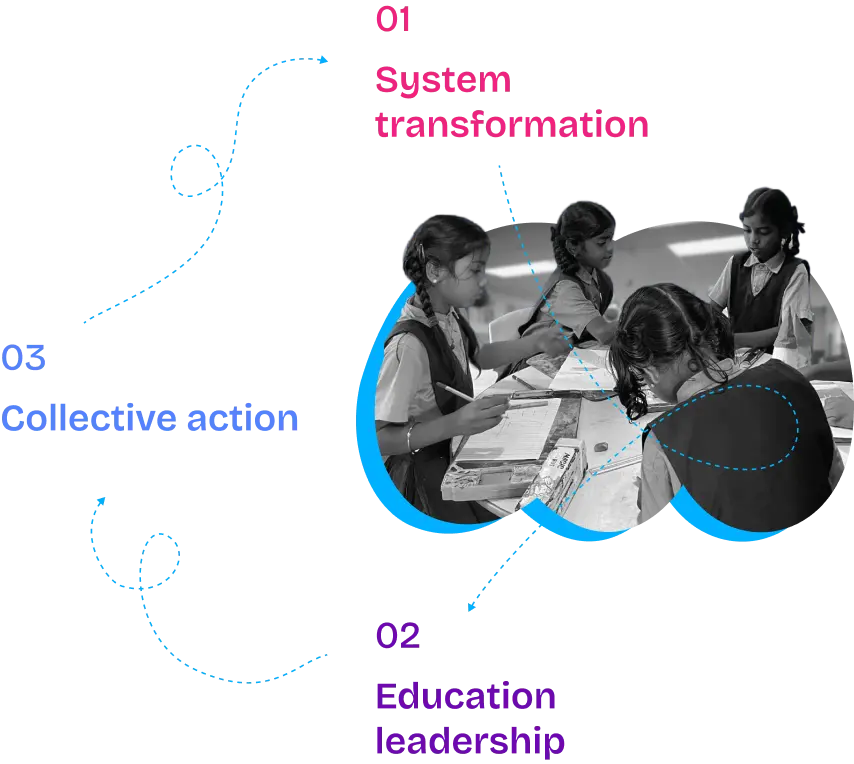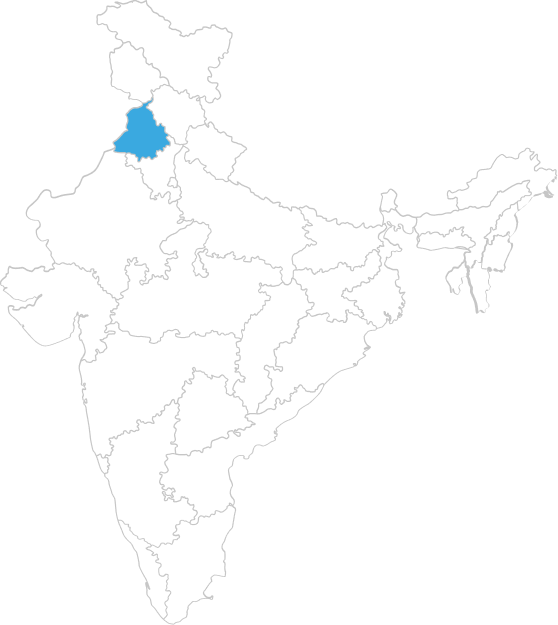Transforming Government Schools in India for Millions of Children
Through innovative strategies, dedicated partnerships, and sustainable solutions, our approach focuses on enhancing educational quality, leadership, and infrastructure to ensure every child receives the best possible learning experience and a brighter future.

Our Footprint
Explore how we’re making a difference where it matters the most.

Schools in Punjab successfully implement a minimum of two school improvement projects
The leadership cadre within the education structure faces challenges in effectively engaging with school leaders (SLs). The absence of middle management creates difficulties in cascading and implementing crucial initiatives from higher levels to SLs and other school administrators. The existing operational workload of SLs often takes precedence, resulting in a lack of motivation and bandwidth to undertake new initiatives. This lack of leadership and coordination hampers the successful execution of essential reforms and improvements.
In May 2023, a 3-day orientation program for Punjab government school leaders aimed to enhance academic excellence and clarify roles. In November 2023, another orientation introduced principals to the Punjab Academic Coaching for Excellence (PACE) program, a coaching initiative for competitive exams like JEE and NEET. Additionally, a 2-day capacity-building session in February 2023 focused on enhancing the skills of subject teachers for PACE.

Building a strong cadre of Block Education Officers (BEOs) in Uttar Pradesh
In Uttar Pradesh, the ‘NIPUN Bharat Mission’ aims for Education system reform, driving the Department of State Education’s launch of the ‘School Leadership Development Program’ (SLDP). School leaders are pivotal in improving school quality and ensuring all children receive a quality education.

Unlocking Resources For DIETs in Bihar
Bihar, one of India’s most populous states with 20 million school-going students, relies on over five lakh government school teachers to nurture the future of 75 thousand schools. However, concerns arise regarding their preparedness for this monumental task. Recognising the pivotal role of DIETs, we started our program in Bihar in 2021, aiming to do systemic reforms and enhance educational leadership. An MoU with SCERT Bihar paved the way for empowering the DIETs through need analysis and effective capacity building.
Co-creating a Monthly Orientation Structure with SCERT, Bihar
SCERT Bihar established a monthly orientation framework to support teachers’ adoption of project-based learning (PBL), complementing existing residential training and DIKSHA courses. This initiative addressed the gap in post-training support often encountered by educators. Beyond facilitating communication from the state to schools, it created a platform for teachers to exchange best practices. By providing ongoing guidance and opportunities for collaboration, the structure ensured sustained professional development and enhanced implementation of innovative teaching methodologies.

Partnership for impact in Odisha
We onboarded five organizations in Odisha to establish a collective aimed at steering planning and strategy for schools catering to scheduled castes (SC), scheduled tribes (ST), and backward classes (BC). This initiative has included orchestrating a tendering process for implementing spoken English and STEM programs and utilizing departmental budgets effectively. Additionally, a long-term planning endeavor has been initiated, culminating in drafting a comprehensive residential education policy. This collective effort has been Facilitated through program planning by each participating organization. Key partnerships have been made with entities such as Pratham Books, Karadipath, Tan 90, Sportz Village, and Shiksharth, emphasizing a holistic approach to Education system reform and community development.

Parent-teacher meeting (PTM) data on the state app & dashboard in Telangana
The integration of PTM data and resources into the state’s existing app emerged From a strategic alignment with ongoing data capture initiatives. Concerns over potential user burden led to the decision to incorporate PTM-related features into the existing infrastructure rather than introduce a separate platform. This consolidation not only streamlined data collection but also enhanced accessibility For headmasters (HMs) and improved data accuracy. Prior reliance on manual reporting methods yielded inconsistent and unreliable data, highlighting the necessity for a more integrated solution. The successful implementation witnessed substantial parent engagement, with an average of 6.5 lakh attendees per meeting, underscoring the effectiveness of the revamped system in capturing and utilizing PTM data.

Project-based learning enhances student outcomes in Andhra Pradesh's backward classes welfare schools
In addition to Bihar, we implemented the PBL in Andhra Pradesh’s backward classes’ welfare residential and educational Institutions. We conducted a third-party assessment there through ConveGenius. This longitudinal study evaluated the effectiveness, impact, and sustainability of the PBL intervention. Using a difference-in-difference quasi-experimental design, it compared student learning outcomes and qualitative feedback from various stakeholders between treatment and comparison groups. Assessments were conducted in September 2023 and March 2024, involving 5,005 students of grades 6 and 7 for English and Math.
The difference-in-differences (DID) analysis showed that the treatment group consistently outperformed the comparison Group in both English and Math. The most significant growth was observed in grade 7 Math, with treatment improving by 49 Points compared to 28 for comparison, leading to a 35% increase in grade readiness versus 18%.

Adoption of monthly peer learning spaces by DIETs in North Karnataka
Mantra4Change, co-creating the School Leadership Development Program (SLDP) with DIET, established the need for block-level leaders to support the Head Masters (HMs) in driving School Improvements (SI). Having identified the need for a space for high school HMs to come together once a month to discuss school improvement challenges and share best practices as part of the SLDP, DIET has set up block-level peer learning circles(PLC). DIET has identified block leaders (BRPs and ECOs) and built their capacity to anchor these PLCs to foster a learning environment for HMs. Mantra4Change has been instrumental in building block leaders’ capacity and HMs’ capacity. DIET also uses these PLCs to build the HMs’ capacity on the month’s topic. While the primary focus is decentralised, block-level capacity building, DIET provides additional online training based on specific needs. A system level change can be seen in how DIET has leveraged the stakeholders and structures in the district to implement the SLDP.
For more information download our annual report

Journeys of Impact and Transformation
Discover personal stories from individuals and communities transformed by our initiatives. These powerful accounts showcase the significant impact of our efforts and the strength of collaboration in driving meaningful, lasting change.

Krishna Reddy,
HM, GHS Ainoli school (Karantaka)
HM, GHS Ainoli school (Karantaka)

Somanath,
HM, GHS Chithali (Karantaka)
HM, GHS Chithali (Karantaka)

Mary Rita,
CRP, Cluster Resource person (Karnataka)
CRP, Cluster Resource person (Karnataka)

Ayeshan,
Assistant Teacher, Government Girls High School Old Vani Vilas School KR Market (Karnataka)
Assistant Teacher, Government Girls High School Old Vani Vilas School KR Market (Karnataka)


